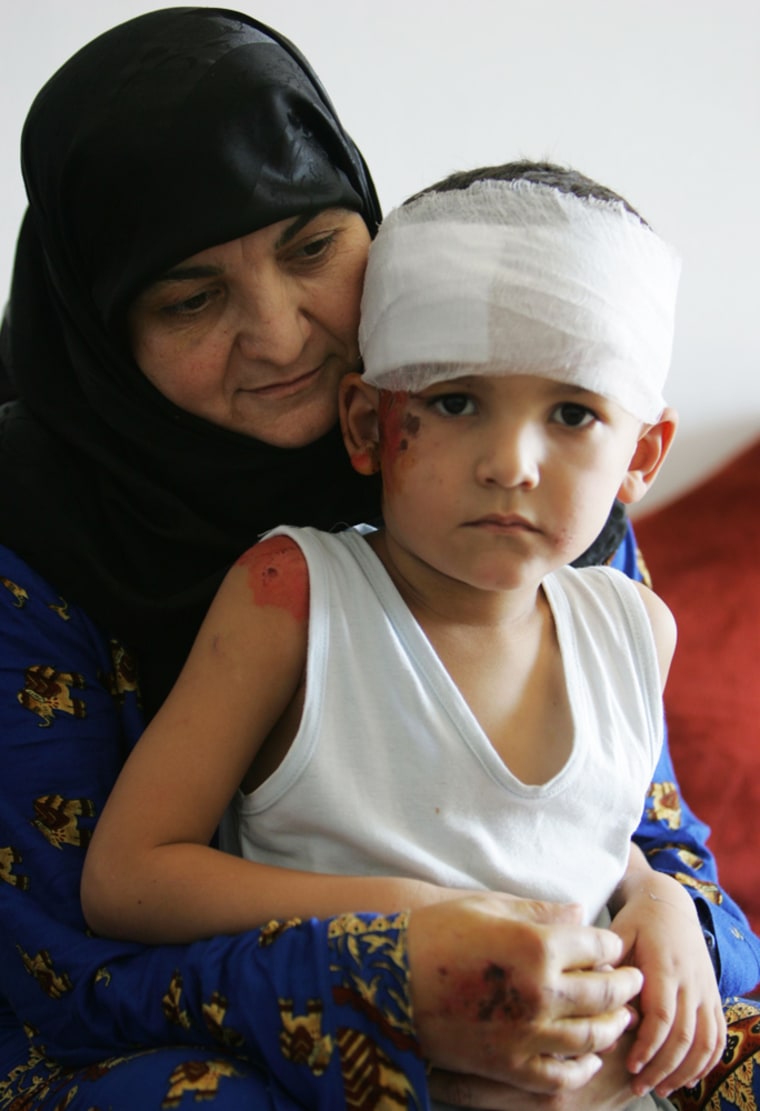Rabab Youssef managed to pull her son alive from the rubble in the Lebanese village of Qana. She could do nothing for her daughter.
“I was calling out to her: ‘Where are you Zeinab?’ I heard no reply. I found the hand of a child raised up,” she said, drawing a deep breath and holding back tears. “I felt her and I knew she was dead. I said: ‘My child, I can’t help you.’”
Rabab’s 6-year old daughter was one of dozens of children killed in their sleep by an Israeli air strike on Sunday on a building where more than 60 civilians were sheltering.
An Israeli inquiry into the attack said the building was targeted because it was believed to be a “hiding place for terrorists”. The airforce would not have bombed if it had known civilians were there, the inquiry released on Thursday said.
Lebanon says at least 54 civilians died in the building.
But, Human Rights Watch listed the names of 28 known dead from the attack and said that 13 others were missing and might still be buried under the rubble. The discrepancy was attributed to more people surviving than originally listed, the group said.
Like many other villagers, Rabab felt it would be the safest place to escape air strikes which had pounded south Lebanon since war erupted between Israel and Hezbollah on July 12.
She and her son, Hassan, since evacuated by relatives to the relative safety of the mountain town of Aley above Beirut, were among the few survivors.
“He was half covered in rubble. I was too, but I could move my hands. I started throwing the rubble off my son,” said Rabab, the four-year-old at her side, his head wrapped in bandages.
“The neighbors came to see if there was anyone they could help. I said: ’My son -- take him.’”
Rabab, 40, then dug herself out of the debris. Her disabled husband, now in hospital, lay face down, calling for help. “I pulled him up as much as I could so he could breathe,” she said. Then she rescued a neighbor.
'Why did you leave me?'
“If there had been light, I could have looked, searched, helped someone. I didn’t collapse or cry. True my daughter had been martyred, but I felt very strong,” she said.
Hassan fell asleep while being rushed away from the devastation by neighbors. “They thought he had died. They put him in a room and wrapped him in sheets. He was still alive, just sleeping. He later asked: ’Why did you leave me?’”
Lebanese rescue workers did not reach Qana until daybreak, unable to move at night because of Israeli air strikes. “There were many children who died of suffocation,” Rabab said.
Israel’s inquiry into the air strike accused Hezbollah of using civilians as defensive shields and said the residents of Qana and surrounding villages had been warned to leave.
But Rabab denied that Hezbollah fighters used the village to shelter or fired rockets at Israel from there and said Israeli air strikes on roads had prevented her family from leaving. “They cut us off from the world.”
Israeli drones made daily flights over Qana and must have spotted women coming and going from the building, she said.
“We say to Israel; ’You killed us on purpose’ and America gave cover to the killers.”
Washington blames Hezbollah for starting the war by capturing two Israeli soldiers and has backed Israel in the war. Washington lists Hezbollah as a terrorist group.
“If they think Hezbollah are terrorists, then what would you call those who killed us? They think that they support human rights -- let them see what’s happening in south Lebanon,” Rabab said.
